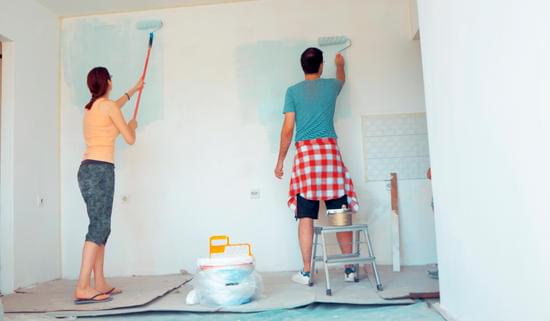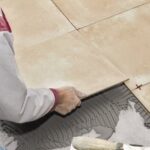Can you get a home improvement loan with bad credit? Many individuals find themselves asking this question when they are in need of funds for home renovations or repairs.
Having bad credit can indeed make it more challenging to obtain a home improvement loan, but it is certainly not impossible. In this article, we will explore the impact of bad credit on the approval process for home improvement loans and discuss the various options and strategies available for those with less than perfect credit scores.
When it comes to obtaining a home improvement loan, having bad credit can significantly affect the likelihood of approval. Lenders often consider an individual’s credit history and score as one of the primary factors when evaluating loan applications. It’s important for those with bad credit to understand how their financial situation may impact their ability to secure a home improvement loan, as well as what options are available to them.
Throughout this article, we will delve into the different types of home improvement loans that are accessible to individuals with bad credit, as well as explore the criteria that lenders typically consider when evaluating these applications. Additionally, we will discuss the importance of credit scores in determining loan terms and interest rates, providing valuable insights for those seeking financial assistance for home renovations or repairs.
Exploring the Options
When it comes to exploring options for home improvement loans with bad credit, it’s important to understand the different types of loans available. One option is a personal loan, which can be used for various purposes, including home improvements. While it may be more challenging to qualify for a personal loan with bad credit, there are lenders that specialize in working with individuals in this situation.
Another option is a home equity line of credit (HELOC), which allows homeowners to borrow against the equity in their homes. This type of loan typically has lower interest rates compared to personal loans, making it an attractive option for those with bad credit. However, it’s important to consider that using your home as collateral comes with the risk of foreclosure if you default on the loan.
Additionally, there are government-backed loans such as FHA Title 1 loans or energy-efficient mortgages (EEMs) that can specifically be used for home improvements. These loans are designed to assist homeowners in financing renovations and upgrades, and they may have more flexible qualification requirements compared to traditional loans.
Overall, while there are several options for obtaining a home improvement loan with bad credit, it’s essential to carefully consider the terms and conditions of each type of loan before making a decision.
| Types of Home Improvement Loans | Key Features |
|---|---|
| Personal Loan | Can be used for various purposes; Some lenders specialize in working with individuals with bad credit; |
| Home Equity Line of Credit (HELOC) | Allows homeowners to borrow against the equity in their homes; Typically has lower interest rates; |
| FHA Title 1 Loans/Energy-Efficient Mortgages | Government-backed loans designed specifically for home improvements; May have more flexible qualification requirements; |
Understanding the Criteria
Getting a home improvement loan with bad credit can be challenging, but it’s not impossible. Lenders typically consider a variety of factors when evaluating loan applications, and understanding what they look for can help applicants navigate the process more effectively.
When considering a home improvement loan application with bad credit, lenders often take into account the applicant’s income and employment history. A steady income and stable employment can demonstrate to lenders that the applicant has the means to repay the loan, even with a less-than-ideal credit score. Additionally, lenders may also look at the applicant’s debt-to-income ratio to assess their ability to manage additional debt.
Another important criterion that lenders consider is the value of the home and the amount of equity the applicant has. Home equity is essentially the difference between the current market value of the property and the outstanding balance on any mortgage or other liens. This equity serves as collateral for the loan and can provide reassurance to lenders, especially in cases where an individual has a low credit score.
Furthermore, lenders also take into account the specific details of the renovation project itself. This includes factors such as estimated costs, scope of work, and potential increase in property value as a result of the renovations. Having a clear plan for how the loan funds will be used and how they will add value to the property can help strengthen an application, even for individuals with bad credit.
| Criteria | Consideration |
|---|---|
| Income and Employment History | Demonstrates ability to repay |
| Home Equity | Serves as collateral for loan |
| Renovation Project Details | Clear plan for use of funds and how it will add value to property |
Importance of Credit Scores
When it comes to obtaining a home improvement loan with bad credit, it’s important to understand how your credit score can impact the terms and interest rates you may receive. Lenders use your credit score as one of the main factors in determining your eligibility for a loan, as well as the terms and interest rates you may be offered. Here’s how bad credit can affect the loan terms and interest rates:
1. Higher Interest Rates: With a lower credit score, lenders may view you as a higher risk borrower, resulting in higher interest rates on your home improvement loan. This means you’ll end up paying more over time for the funds you borrow.
2. Limited Loan Options: Having bad credit can limit the types of home improvement loans available to you. You may need to explore alternative options such as secured loans or government-backed programs that are specifically designed for individuals with poor credit.
3. Shorter Repayment Terms: Lenders may offer shorter repayment terms to borrowers with bad credit, which can result in higher monthly payments compared to those with good credit. This is important to consider when budgeting for your home improvement project.
It’s important to keep in mind that while bad credit can impact the loan terms and interest rates you receive, there are still options available for individuals looking to finance their home renovations despite their credit history. By understanding how bad credit can affect your loan options, you can take steps to improve your financial situation and increase your chances of securing a favorable home improvement loan.
Strategies for Approval
If you have bad credit but are in need of a home improvement loan, there are still options available to you. While it may be more challenging to secure a loan with less than stellar credit, it is not impossible. Here are some strategies and tips to help you increase your chances of approval for a home improvement loan with bad credit:
1. Research Lenders: Start by researching lenders who specialize in working with individuals with bad credit. There are financial institutions and online lenders that offer specific loan products for those with lower credit scores. Look for lenders that have favorable terms and interest rates for borrowers with bad credit.
2. Provide Collateral: Offering collateral, such as home equity or other valuable assets, can help offset the risk for lenders when lending to someone with bad credit. This can improve your chances of approval and may even result in better terms and lower interest rates.
3. Improve Your Credit Score: While this may not be an immediate solution, taking steps to improve your credit score can greatly increase your chances of securing a home improvement loan. Paying off existing debts, disputing errors on your credit report, and maintaining a good payment history can gradually raise your credit score and make you a more attractive borrower.
By implementing these strategies and being proactive in your approach to securing a home improvement loan with bad credit, you can increase your chances of approval and find a loan that meets your needs without breaking the bank.
Alternative Solutions
When facing the challenge of securing a home improvement loan with bad credit, it’s important to know that there are alternative financial options available for those in this situation. While traditional home improvement loans may have strict credit score requirements, individuals with bad credit can explore other avenues for funding their renovation projects.
Personal Loans
One option for funding home renovations with bad credit is through personal loans. These types of loans are unsecured, meaning they do not require collateral, and can be used for various purposes including home improvements. Personal loans for bad credit often come with higher interest rates and stricter terms, but they can still provide the necessary funds for renovations when traditional options are not available.
Home Equity Line of Credit (HELOC)
Another alternative solution for obtaining funds for home renovations with bad credit is a Home Equity Line of Credit (HELOC). This type of loan uses the equity in a homeowner’s property as collateral, making it an option even for those with less-than-ideal credit. With a HELOC, homeowners can access a line of credit based on the value of their home and use it to finance their renovation projects.
Government Programs and Grants
For individuals with bad credit who are in need of financial assistance for home improvements, exploring government programs and grants can be a viable option. Some local or state government agencies offer assistance programs or grants specifically aimed at helping homeowners make necessary repairs or upgrades to their properties. These programs may have income and eligibility requirements, but they can provide valuable support for those in need.
By considering these alternative financial options, individuals with bad credit
Case Studies
Overcoming Obstacles: How These Individuals Secured Home Improvement Loans
One success story comes from John, who had a credit score below 600 due to past financial difficulties. Despite his bad credit, John was able to secure a home improvement loan by providing a detailed plan for his renovation project and demonstrating his commitment to improving his credit. He also opted for a secured loan, using his home as collateral to mitigate the risk for the lender.
Another individual, Sarah, faced similar challenges with her credit history. However, she was proactive in improving her credit before applying for a home improvement loan. By paying off outstanding debts and consistently making on-time payments for several months, she was able to show lenders that she was a responsible borrower. As a result, Sarah was approved for a home improvement loan at a reasonable interest rate.
Expert Advice: Tips From Financial Advisors
According to financial advisors, one effective strategy for obtaining a home improvement loan with bad credit is to seek out lenders who specialize in working with individuals with less-than-perfect credit scores. These lenders may have more flexible eligibility criteria and be more willing to consider factors beyond just the applicant’s credit history.
Another piece of advice is to consider applying for government-backed loans or programs designed to assist individuals with low credit scores. For example, the Federal Housing Administration (FHA) offers Title I loans specifically for home improvements and renovations, which can be accessible to those with poor credit.
Empowering Others: Sharing Insights and Lessons Learned
These success stories serve as inspiration for others facing similar challenges with bad credit. They illustrate the potential for individuals to overcome past financial setbacks and still access funding for necessary home improvements. By taking proactive steps to address their credit issues and exploring alternative financing options, these individuals were able to achieve their goals and enhance the value of their homes.
Conclusion
In conclusion, it is possible to secure a home improvement loan with bad credit, although it may require some extra effort and research. While having bad credit can make the process more challenging, there are still options available for individuals looking to renovate their homes. By exploring different types of home improvement loans, understanding what lenders look for, and taking steps to improve your credit score, you can increase your chances of approval for a loan.
It’s important to remember that bad credit can impact the terms and interest rates of the loan, so it’s crucial to be prepared for potential higher costs. However, by being proactive and finding alternative financial solutions, such as government-backed loans or personal loans from family or friends, you can still make your home improvement dreams a reality.
Additionally, seeking guidance from financial advisors or credit counselors can provide valuable insight and support in navigating the loan process with bad credit.
Ultimately, with determination and careful planning, individuals with bad credit can find success in obtaining a home improvement loan. It may take time and effort, but by utilizing the strategies and tips outlined in this article, you can move forward with confidence in achieving your home renovation goals. Remember that each person’s journey will be unique, but there are options available for those willing to put in the work to improve their living space despite their credit challenges.
Frequently Asked Questions
What Credit Score Do I Need for Home Improvement Loan?
The credit score needed for a home improvement loan varies among lenders. Generally, a credit score of 620 or higher is considered good enough to qualify for a home improvement loan. However, some lenders may require even higher scores, so it’s important to shop around and compare offers.
Can You Borrow Money Against Your House if You Have Bad Credit?
Yes, it is possible to borrow money against your house even if you have bad credit. One option is a home equity loan or line of credit, which allows homeowners to borrow against the value of their home. However, having bad credit may result in higher interest rates or less favorable terms.
What Credit Score Do You Need for Window Financing?
The specific credit score needed for window financing can vary depending on the lender and the type of financing being offered. In general, a credit score of 600 or above may be sufficient to qualify for window financing, but again, it’s essential to check with different lenders to find out their specific requirements.

I’m thrilled to have you here as a part of the Remodeling Top community. This is where my journey as an architect and remodeling enthusiast intersects with your passion for transforming houses into dream homes.





